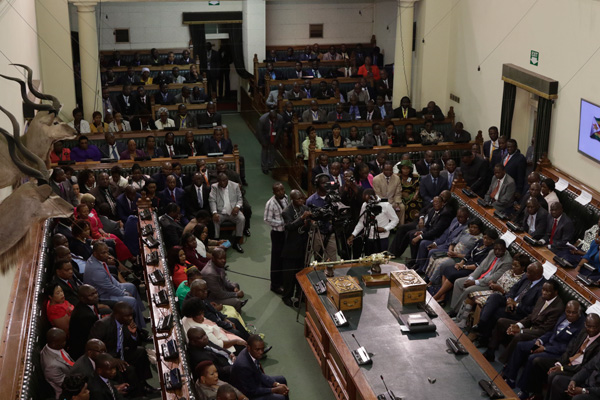
INTERNATIONAL Labour Organisation (ILO) senior programmes officer, Adolphus Chinomwe yesterday urged Parliament to align laws that will curb trafficking of persons, as the labour legislation is not in tandem with the Constitution.
BY VENERANDA LANGA
Chinomwe had appeared before the Senator Mike Nyambuya-led Parliamentary Thematic Committee on Human Rights to speak on human trafficking for forced labour.
He told Senators that victims of human trafficking were not only maids, but even professionals like engineers, architects and footballers were being lured to Gulf states and to neighbouring countries after being promised lucrative jobs only to find themselves being enslaved.
All this, Chinomwe said, was being achieved through unregulated recruitment agencies masquerading as professionals and using very sophisticated websites and social media platforms to lure unsuspecting job seekers.
“We have the anti-human trafficking law, but it needs to be strengthened so that it speaks to other laws like the Immigration Act, Labour Act, and all these laws need to be aligned with the Constitution so that they speak to each other,” he said.
“At Southern African Development Community regional level, we also need to harmonise laws so that member states come up with labour and migration policies that speak to each other.”
Chinomwe warned that students were also falling into the trap and being lured to countries like China on fake scholarships after not doing security checks to find out from embassies if the scholarship promises were authentic.
- Chamisa under fire over US$120K donation
- Mavhunga puts DeMbare into Chibuku quarterfinals
- Pension funds bet on Cabora Bassa oilfields
- Councils defy govt fire tender directive
Keep Reading
“This year alone, I dealt with three cases of students who died in China in mysterious and suspicious circumstances. There are many dimensions to this, but what we need to do is to strengthen the ministry of Labour to inspect many aspects of labour migration and recruitment.”
He said cases of human trafficking for forced labour were difficult to deal with as some came in the form of even rebel groups, cruel governments, enterprises, criminal syndicates and individuals.
“Some people end up being abducted for organ trading, forced marriages and prostitution, and even false adoption promises for children. To a certain extent, social media is used to entrap migrants. We need to manage recruitment agencies, and ILO has developed a fair recruitment agenda, which is a list of 10 policies that governments should look at before people get trapped,” Chinomwe said.
He said in 2014, ILO estimated that the world value of forced labour was $150 billion.
“A lot of money gets exchanged. An employer can buy 10 maids at $50 000 and then the agent demands $2 000 per month. Most of these Arabs are very rich, as they are oil people, and after a year the recruitment agent would have been paid $240 000. So there is a lot of money exchanged in human trafficking,” Chinomwe said.
More than 200 Zimbabwean women were last year reportedly trafficked to Kuwait, where they were abused and paid slave wages.











